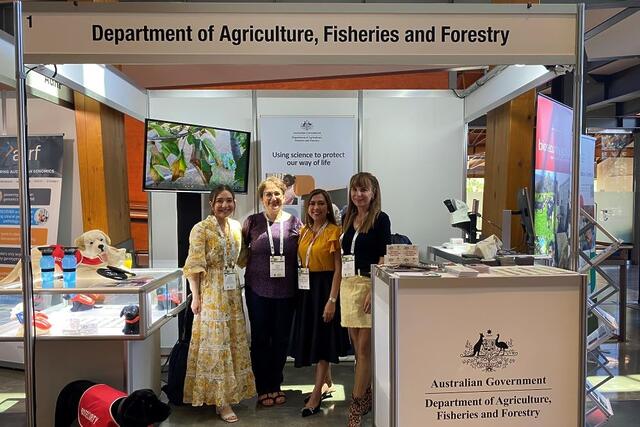Highlighting plant biosecurity tools and opportunities
MALDI-ToF stands for Matrix Assisted Laser Desorption, Ionisation mass optometry, with ToF standing for time of flight. Taking a sample, coating it with a chemical, shooting it with a laser, and after following the shot with a laser goes up and is detected by a very sophisticated detection mechanism that precisely measures the mass of the proteins in the sample.
This allows identification really rapidly, like sub 30 seconds for most things, and identification following that immediately. So we’re looking at something that can identify bacteria and fungi in a matter of seconds and that allows super high throughput. You can test tonnes of different samples, entire mixtures of different chemicals really rapidly. There’s nothing that compares to it in terms of a screening tool and really allows targeting of additional technologies later in the culturing bases.
We have a range of plant pathogens that could come in and adversely affect our plant production in agriculture and horticulture or the natural environment, as well as pest. But plant diseases make up about half of the top 42 pests and there are a whole lot of other ones that would significantly impact agriculture or horticulture if they arrive and establish and spread.
Over the years we’ve had a number of incursions of the citrus canker pathogen that’s a bacterium that infects the fruit and also other parts of the tree. Most of our major horticultural and field crop species have a range of pathogens that are still exotic to Australia. So banana has had some incursions of strains of the fusarium wilt fungus, and particularly one called race four that’s an outbreak that’s trying to be controlled in Queensland at the moment. There are other banana pathogens that are emerging globally. There’s one in Africa that’s a bacterium that’s causing a lot of havoc there and it would be a problem if it got into Australia as well.
Again, prior to MALDI you wouldn’t be able to get an identification within the first 24 hours of a wide variety of targets. You could possibly do one with other technologies, but you wouldn’t be able to do a wide variety of targets. So MALDI’s great capability is the fact that everything that comes off of that particular fruit of interest can be tested, screened, you’re completely confident nothing on there is of concern.
Plant pathology diagnostics generally starts with observation of symptoms, we try and decide if that looks like a virus or a bacterial or fungal infection. If it’s bacterial or fungal then we generally need to isolate the bacterium or the fungus into pure culture, and then there’ll be a range of tests to try and resolve what it is. Some of that could be just basic microscopy, some of it might be biochemical testing. Ultimately once you’ve obtained a pure culture, which could take several days, where you have to subculture it a number of times to make sure it’s just a single organism, at that point then we can do DNA sequencing. MALDI-Tof allows us to come in much earlier in that culturing process, and it may not give an exact identification at the beginning, especially if bacterial cultures or colonies are still mixed. But it has proven to be able to give us an indication of what might be there. When we play the bacteria there might be dozens of small colonies and many of them look very similar and could be different species. With MADLI-Tof, we can test all of them and decide which ones to focus on. And that’s where it really proved to be a game changer for our diagnostic workflow because we can quickly eliminate the ones that we’re not worried about and target the ones that are of greatest concern.
The database is key to the entire process. Without the database, you cannot tell whether something is a particular species or not. Luckily the commercial instrument itself comes with 10,000 fingerprints which relate to about 5000 species. So there’s duplicates obviously, but that allows for greater confidence because if you get duplicate results for the same thing, your really confident of that match. You can actually add and supplement new things to that library and we have an entire process in place, including standards that we’re working on a national level.
MALDI-Tof’s really transformed our diagnostic workflows for plant pathology and has improved the way we deliver biosecurity and regulatory outcomes.
View Original | AusPol.co Disclaimer
